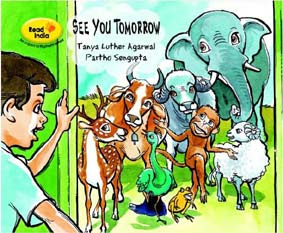Book Review – “See you tomorrow”

Earlier this month, we were giving out review copies of few of our books. We were excited to hear what all of you thought of our books (the good things and the bad things!) and hope that this feedback from people (educators, parents, book lovers, children) will help us create better books and help you choose books for your own kids.
This detailed book review comes from Malavika.

p { margin-bottom: 0.21cm; } “See you tomorrow” Set against the delightful lush green backdrop of village, is the story of a small boy and his journey from school to home. “See you tomorrow” highlights the boy’s encounters with his daily friends, all of who happen to be bright and cheerful looking animals, ranging from a tiny frog to a big sized elephant. Things go slightly wrong when he says something he hadn’t seriously meant. Beautiful water color pictures, coupled with perfect expressions make the book a visual treat. Though the book has very little dialogues and just “see you tomorrow” punch line repeating itself in the encounters throughout the journey, the story manages to convey the message in a clear and crisp manner. Though a village boy, the child looking somewhere between 7-10 years old, is a happy child, who wishes to see happiness in everything around him. It is due to this that he is friendly to even animals that come into his way on his journey to school and back. The boy loved animals and even if he had not meant what he said, he still reworked on his mistake. It is for this reason, the boy happily treats his friends in the end to a hearty sumptuous breakfast, though it was something unplanned and he had not seriously meant to see them the next day. Like him his mother is equally delighted at the prospect of feeding her guests and she too beckons them happily. The locales of the village spark the purity of the village ambience. Throughout the journey, the boy is often depicted against backdrops featuring ponds, huts, temple, a wood paneled bridge, vast grasslands and many more breathtaking village landscapes. The animals looked healthy and happy. However, it had been for the boy’s casual comment that they decided to take him seriously at it. It was owing to this that they turned up at his house for a breakfast. However, though the boy loved these animals he had never meant to see them getting all turned up for the next day’s breakfast. Once the breakfast was over, the boy realized his mistake and the animals did make it sure that he better be serious with his words. That’s why the boy at end did no more mention “see you tomorrow”. He left it as “sometime”, realizing the possible effect of the spoken words. The writer and the illustrator of this book have done a great job to voice concern over casual remarks, thrown sometimes without much seriousness by children. Thinking twice before speaking is a good lesson that comes across in this book, which is important for all the parent’s to teach their children. If one cannot commit to what one says then one should not utter words for the sake of it. This book is a must read for all the parents and their children, who seek visual treat with less number of words to make the right impact. I recommend this book to all children who need to be taught the seriousness of the spoken words. Maybe it will also allow parents to do and display the same.Click here to buy this book







